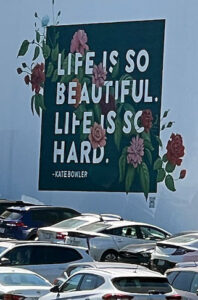My Hometown
 My hometown. I spent several days in Durham to visit with some old friends. Now life has resumed for me in Batavia.
My hometown. I spent several days in Durham to visit with some old friends. Now life has resumed for me in Batavia.
I have lived nearly all of my adult life in the Midwest. The values and viewpoint of the middle of the Midwest are the composite self that most easily presents to my awareness. I belong here. Exactly where do you mean by “here”? To begin, “here” is the Starbucks at 3rd and State in Geneva, my mind wrestling with words. More to the point, my participation in the resources for learning and living occasioned by Chicago, the commercial hub of the nation, have greatly shaped the adult self which I ponder. The older one becomes, the more one has to ponder.
Like striking flint to steel, a visit to Durham ignites self reflection. My earlier self was formed by  eighteen years of living in Durham. After leaving home I spent several years in Japan, and then returned to Durham to see whether it was possible to put down roots. The individual that I was then, had no idea at all about what I desired, which is an another description of rootlessness. As fortune would have it, the three of us, including a newborn daughter, “immigrated” to Chicago, where our education began.
eighteen years of living in Durham. After leaving home I spent several years in Japan, and then returned to Durham to see whether it was possible to put down roots. The individual that I was then, had no idea at all about what I desired, which is an another description of rootlessness. As fortune would have it, the three of us, including a newborn daughter, “immigrated” to Chicago, where our education began.
From a vantage point of the present leaving was necessary. A beginning only happens where one has not been.
 The Durham of my memory seemed a loose fitting laminate of two communities. The blue collar working class town which you’d encounter Saturday’s in the shops on Main Street, or at Sears, or at the Bull Durham Ballpark, and that of the community of scholars defined by the campus, the gardens, the hospital and the majestic chapel of Duke University. It seemed to me that the traditional working class Southern community and that of Duke, the “Harvard of the South” did not conveniently mix.
The Durham of my memory seemed a loose fitting laminate of two communities. The blue collar working class town which you’d encounter Saturday’s in the shops on Main Street, or at Sears, or at the Bull Durham Ballpark, and that of the community of scholars defined by the campus, the gardens, the hospital and the majestic chapel of Duke University. It seemed to me that the traditional working class Southern community and that of Duke, the “Harvard of the South” did not conveniently mix.
My visit to my hometown reminds me of just how much this place is a part of me. Also, it is clear to me that Durham has changed in some positive ways. No longer a Piedmont town, the Durham metro area has a population of 439,000. Compared with the small town which I remember, a cosmopolitan vibe is conveyed by those I now encounter. No longer a somnolent blue-collar town, – the two large tobacco companies are memories, factories are repurposed for living quarters, and offices, warehouses renovated to house retail shops. Durham is a diverse community. Duke Medicine is a magnet for patients and for medical professionals seeking a world-class education in the field. Durham feels wide awake.
 One of my favorite places to visit is The Regulator Bookstore on Ninth Street. The Regulator makes a point of carrying cutting-edge books purposed to change your life. Discovering a book by Slavoj Zizek, Freedom A Disease Without Cure, I had to have it. This is the Slovenian philosopher’s latest. I understand that Zizek is seventy-five the same age as me. I have some of his earlier books, and lately have a renewed interest in his work. In the Durham of my youth, a book authored by a “conservative communist” would have been nonexistent.
One of my favorite places to visit is The Regulator Bookstore on Ninth Street. The Regulator makes a point of carrying cutting-edge books purposed to change your life. Discovering a book by Slavoj Zizek, Freedom A Disease Without Cure, I had to have it. This is the Slovenian philosopher’s latest. I understand that Zizek is seventy-five the same age as me. I have some of his earlier books, and lately have a renewed interest in his work. In the Durham of my youth, a book authored by a “conservative communist” would have been nonexistent.
The first photo was taken from a window of the United airliner upon our return. The shoreline of Like Michigan and the skyscrapers of Chicago are visible. Two following photos were taken standing on the sidewalk by The Regulator Bookstore. Handbills are evidence of the intellectual edge which are part of present day Durham.
The final photo was also posted on yesterday’s entry. The author of the quotation is Kate Bowler, a professor at the Duke Divinity School, and an author. In 2015 she was diagnosed with stage IV cancer.